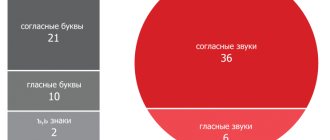Choosing a topic that is suitable for the speech
You can speak on any topic, about anything in the world, as long as this topic is close to the speaker and interesting to the listeners.
What can you talk about?
You can, for example, show off your erudition and choose a topic about some unique animal, about the inhabitants of the underwater world.
Talk about pets - and this will be a very successful speech that will come from the heart.
You can find an interesting topic that people will listen to. What do people like to hear about?
They love to hear, for example, how someone was an ordinary, unremarkable person, but became famous and successful.
You will also be heard about the mysterious, incomprehensible or unusual.
Watch this video. Here is a good example of an interesting story theme that can be told at a party or with friends.
- It will come in handy as a universal theme for any occasion where you need to tell something.
Work and employment
What other interesting topics are there for speaking? So, in school groups you can talk about employment problems. In this case, you can choose the following topics for the report:
- Choosing a profession: what should it be based on?
- Problems of youth during employment.
- The most requested professions.
- The highest and lowest paid professions.
- Rules for writing a competent resume.
- How to successfully pass an interview and what do you need to know for this?
A speaker can come up with a thousand interesting topics for his speeches
Ready-made themes (see below) will do Coming up with a speech to give on your own brings both pleasure and pride : “I came up with it myself!”
But before taking on speech topics , it is useful to learn public speaking. My book can help with this, which I recommend reading:
- A book about public speaking for everyone
Requirements for the report
Preparing a report always requires maximum independence and intellectual work from the performer. To begin with, the question of what topic can be written for a research paper is thought through, then literature and information are selected, and a structure is drawn up based on this. It is equally important to know the basic requirements for text formatting, so that at the end of the work you do not have to edit everything from the very beginning.
Need help writing a paper?
Find out the cost
Structure
Plan and structure are similar terms, but the meaning is slightly different. In the first case, we are talking about all the paragraphs and subparagraphs of the report, in the second - the key parts of which the student’s work actually consists. The required components of the structure will be:
- Introduction – greeting listeners and audience.
- Introduction - a brief overview of the upcoming speech, the desire to interest the audience, the formulation of the relevance of the topic, importance, purpose and objectives of the work.
- The main part - the student tells each part of the project according to the plan, namely, research methods, theory, hypotheses, actions through which the results were obtained. Perhaps the student has new information that can be mentioned at this stage.
- Conclusion - the author briefly goes through the key issues of the topic, the methods involved, demonstrates the results and conclusions. After this, the performance is considered over.
Requirements for registration according to GOST
It’s not enough to prepare a report, present it interestingly in relation to the audience, convey the content and in the end, the teacher will also evaluate the correctness of the format and compliance with GOST standards. Namely:
- printed or handwritten on A4 sheets;
- the printed version is created on a computer using Microsoft Word;
- acceptable volume 5-10 pages;
- font Times New Roman 12-14 point, justified;
- one and a half interval;
- page numbering at the bottom with center alignment everywhere except the title page and outline;
- paragraph indent from the left margin is 2.25 cm;
- at least 5-8 sources of information;
- references to primary sources are required;
- margins – left 2.5 cm, right 1 cm, bottom and top 2 cm.
Despite the fact that page numbering begins with the introduction, the title page and contents are necessarily taken into account when counting. That is, if the introductory part is the 3rd sheet of the project, you need to start numbering with the number 3.
Rare topics for speech
- Consumer culture
- Molecular cuisine
- Gothic architecture
- Pop Art
- Elite culture
- Augmented Reality
- Who are the freaks
- Downshifters
- Body positivity
- Decorative engraving
- Murals
- Grotesque
- Globalization
- Hegemony
Interesting themes revealed in parables
The best parables about life and wisdom
The themes raised in the parables are wise and useful. Everyone will listen to parables with great pleasure. We offer ready-made wise parables with which you can speak to any audience.
- The secret of family happiness.
- The secret to longevity
- How to find friends
- How to learn to divide equally
- The secret of education
- A parable about how to conquer a man
- Other interesting parables
Intimate questions
And the last block, which is no less necessary and important, is sex issues. These are very interesting topics for speaking to an audience, which, unfortunately, in our society everyone tries not to touch upon. But in vain, because today’s youth really lack adequate sex education. Here is a list of sample topics:
- About the first experience of sexual relations.
- Sex: what is it and when does a person need it?
- What are means of protection, what are they?
- When and how can a girl become pregnant?
- What does it mean to be parents?
- When should you start having sex?
There are actually a lot of questions here. And we need to raise them. After all, modern society, unfortunately, does not have sufficient knowledge in this area.
Order a topic for a speech
We can prepare a topic for your speech. And it's not expensive.
We also train and help perform. We give recommendations and teach public speaking.
- Online public speaking training
Big request:
If some topic for speeches is not here, write in the comments what topic for speeches would be useful to insert on this page. And we will do this soon.
Thank you very much for your interest in our site. We will be grateful if you click on the advertisement on the site - this is the best thank you!
Video about gestures. What mistakes do people make if they don't know how to speak?
Have a look, it will be useful
Topic for speech
/ Interesting topics for a speaker’s speech / report, monologue, speech, essay on an interesting topic / oratorical speech on a topic / the most interesting topics for speeches on rhetoric / interesting reports and speeches / the most interesting oratorical speech on a topic / topics of oratorical speech / ready-made speech for a speech / topics for public speaking / oratorical speech on any topic / ready-made oratorical speech / speech on rhetoric / what you can tell the audience about / Report / Topics for argumentative speech / Discussion topics for oratorical speech / Where to get a topic for a monologue (report, essay, speech, debate) /
Nature and ecology
What is it, an interesting topic for speaking? Why not touch on global issues and talk about the state of modern ecology? How scientists evaluate everything that happens on earth, what cataclysms and problems are caused by this or that human action.
Here you can come up with many different interesting topics:
- The problem of uncontrolled deforestation.
- Pollution of the environment by vehicle exhaust gases.
- The most environmentally friendly mode of transport.
- Gaining energy from environmentally friendly sources.
- Water pollution.
- Declining global freshwater supply.
How should you write a report?
Need help writing a paper?
Find out the cost
How to start working on the report? You can sketch out a template of what the work should consist of, namely:
- selection of topics in the discipline, be it in the Russian language, literature, history, etc.;
- preparation of sources and collection of information;
- planning;
- summarizing;
- preparation for additional questions.
Experience shows that not knowing how to make a plan becomes a fatal mistake. Therefore, start from this point, approve the approximate structure of the project with the teacher, and only after that start writing the basis.
Choosing a theme
Most often, students are offered several topics to choose from for a project; less often, the teacher, taking into account the characteristics of each student, assigns assignments individually. Here are some valuable tips for choosing a topic:
- Receive instructions from the teacher, study the task to understand the essence of the task . Most often, the guidelines will already indicate the issues that need to be covered in the report. Be sure to evaluate the intended audience for your speech, this will set the correct style of presentation.
- Choose a topic for the project that will be interesting and accessible to you . If the teacher himself asked the topic, find those questions to consider and solve that would be interesting to the audience and to you.
- Let the topic be original and exciting , attracting the attention of the audience from the first minutes of the presentation. It is important that the issues addressed are not considered by other students and their projects.
- If the topic is too difficult, talk to the teacher for a change. This is better than trying to curb something that is beyond your power.
- , etc. But first of all, make sure that the information is reliable before you take it as a basis.
- Take notes while collecting information , if you used even the slightest information, mark the publication, year of publication, author, city of publication, page number. At the end, you can easily make a list of the sources involved.
Preparing to write a report
In any important project, preparation is a significant stage of execution. How to prepare a report:
- think over the style of conveying information to the audience in order to attract and maintain attention from the beginning to the end of the speech;
- define the design rules in advance, use the manual or GOST provisions;
- jot down the main thoughts on the draft to visually assess the quality of the work, and then reveal interesting thoughts, give reasons, make your suggestions and methods for solving problems.
As you create your draft, it will become much easier for you to structure your research. Rely on general provisions and rules, excluding unnecessary things, but introducing what is important.
Planning a report
If you have already prepared the abstracts around which the research will revolve, you can move on to the next task - building a plan. It depends on the chosen topic and on the identified problems. You can make a plan:
- linear – there will be a transition from the thesis to argumentation and vice versa;
- branched - will be descriptive or analytical in nature.
The report is structured into chapters and paragraphs (that is, a complex plan). The table of contents contains page numbers; each item (chapter, paragraph, section or subsection) should begin with them. According to GOST, the chapter always begins on a new sheet, titles and headings are located in the center of the line without a dot at the end. Hyphenations and quotation marks will be inappropriate.
Suggestions for writing
Before writing a research paper, once again indicate to yourself that the most important components are the introduction, body and conclusion, and only then the list of references is supplemented. To make it easier to compose the first and last paragraph, start with the main part. And after that you will probably understand how to write the introduction and summary.
Introductions
The introduction is the face of your project, a brief message to the viewer as motivation for further listening. Be sure to say hello and introduce yourself, and then indicate:
- topic;
- target;
- subject and object;
- tasks.
It’s good if in the introduction you prove the relevance of the issue under consideration. We offer a sample introduction as a visual example:
Main part (body) of the report
The body of a research work is the definition of the main part, where the theory on a given topic, the main idea, should be presented. In simple language, the main thesis is indicated and a structure is built around it. For example:
After the theory, a practical component is necessarily given, everything depends on the specifics of the subject, topic and problem under consideration. Usually these are all kinds of formulas, tables, diagrams, data analysis or trial analysis, and only then the results of the methods and actions used.
Conclusions
Observing the order of the structure of the essay (and any other student’s work), then you need to summarize the theoretical and practical parts. The speaker can clarify the topic, the period or problem under consideration, identified features and shortcomings, thoughts and conclusions, applicable techniques and experiments.
For example:
List of references and sources
An equally important question will be how to make a bibliography. Practice shows that many authors make a number of mistakes in this section. This necessarily includes books and textbooks, electronic resources, magazines, newspapers, etc., everything that provided information for the author.
The list of sources is compiled in alphabetical order; for this purpose, certain GOST design rules are followed. You can see what this looks like in the example:
Common mistakes
To prepare your project perfectly, prevent the typical mistakes that most students most often make. For example:
- negligence in design;
- wrong font;
- non-compliance with the structure and sequence of plan elements;
- violation of the norms for compiling a list of references and citing;
- inconsistency of references to the list of references;
- the presence of quotes, ideas, concepts and diagrams without references to the authors;
- lack of logic of presentation;
- use of input data that is outdated (more than 5 years after publication);
- bringing information, concepts, information not related to the topic;
- low text uniqueness;
- categorical criticism of theories and concepts;
- free informal style of presentation.
Practice shows that the success of such student work directly depends on 3 key criteria - literacy, uniqueness and academic writing style.
Visual aids: how to do them correctly?
In parallel with the student’s research work being prepared, visual illustrated materials are compiled. You can include the most important things in it, for example:
- generalizations and conclusions;
- results of the author's analysis;
- supporting illustrations;
- methods and instructions;
- tables with numerical data, etc.
On average, no more than 10 A4 pages are allocated to such a section. Any table, figure, photograph, chart or diagram in the text should have redirections, as well as links like “Compiled by the author”, a link to the original source.







